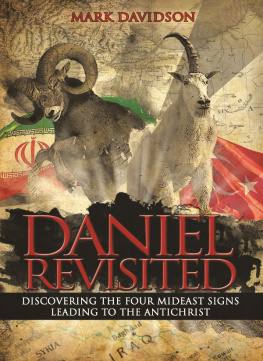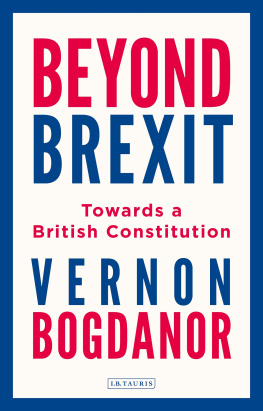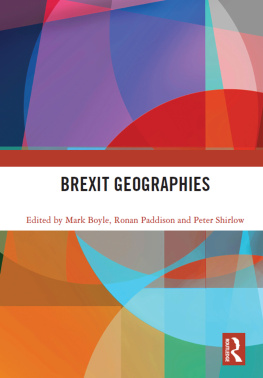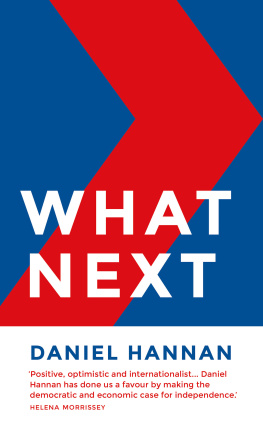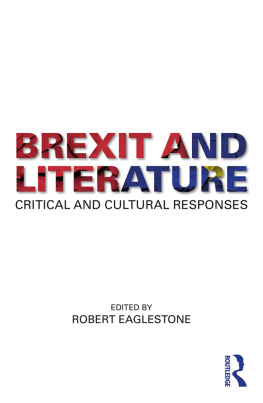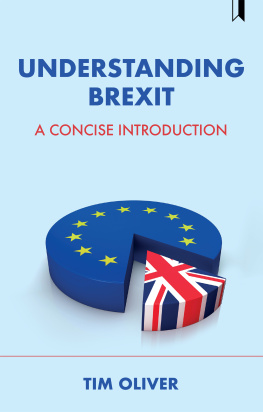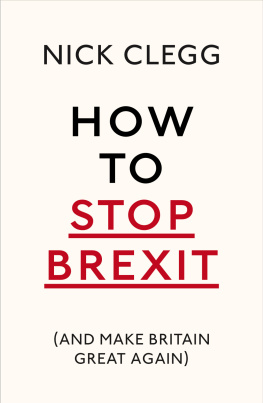Were Doomed!
Brexit Revisited
Dr P. R. Datta
Anindya Dasgupta
Mark T. Jones
Centre for Business & Economic Research (CBER), UK
Copyright 2020 By the authors
All rights reserved
The characters and events portrayed in this book are fictitious. Any similarity to real persons, living or dead, is coincidental and not intended by the author.
No part of this book may be reproduced, or stored in a retrieval system, or transmitted in any form or by any means, electronic, mechanical, photocopying, recording, or otherwise, without express written permission of the publisher.
ISBN-13: 9781234567890
ISBN-10: 1477123456
There are number of websites and weblinks are that used in this book. However, due to the dynamic nature of internet, these addresses or links may have changed or are no longer valid since many of the pieces were written over the course of past 4 years. The views express in this book are solely those of the authors and do not necessarily reflect the views of the publishers, and the publisher hereby disclaims any responsibility for them.
Cover design by: Art Painter
Library of Congress Control Number: 2018675309
Printed in the United States of America
Dedication
To all those who harbour dreams of freedom, self-determination, and independence. The path may be long and rugged, and there may be those who seek to thwart and belittle your aspiration, but with quiet determination extraordinary things are possible.
Contents
F oreword
Were Doomed! Brexit Revisited
The dire predictions [of fire and brimstone] will not come to pass, Brexit will be done, no matter how imperfectly, and the world will keep turning
With these words the authors of the book, Were Doomed! Brexit Revisited introduce the reader to a chronological detail of the days and events leading up to, and there-after, the greatest event Britain has experienced since the Second World War. The reader will learn of the history leading to Britains entry to the European Union (and some of the problems experienced in 1973 when she joined the European Economic Community), including the EU officials who had no real interest in Britain joining the Union; the domination by the EU of Britains industries, especially the fishing fleets with restricted access to European waters but allowing the influx of foreign boats in British fishing areas; the disregard for the Commonwealth countries traditional to Britains economy, and, which features prominently in 2019/2020, the open-access borders which have allowed criminals and terrorists to infiltrate the EU, and Britain. It is interesting to note that, while Scotland in general voted to remain in the EU, the Scottish fishermen were overwhelmingly in favour of leaving.
The Leavers and the Remainders waged a verbal (and sometimes a physical) war to persuade the British voter to their cause. Perhaps the most comical of these events was the episode on the River Thames on 15 June 2016, when boats with supporters of the Leave and Remain bodies tried to outmaneuvre and out-sing each other. The irony of this faade was that it took place exactly 800 years after the signing of the Magna Carta, which granted privileges and rights to the English citizenry. The public were reminded of the economic chaos in Britain in the 1970s, and the anticipated salvation of the nation through the expanded markets then available for commerce and trade. Trade unions ruled the economy and politics, and examples to contain them had been sought in the EU. The Leavers pointed out the influx of unskilled and semi-skilled workers from the former East Bloc countries, at the expense of skilled and academically qualified persons from Commonwealth nations. The Remainders wanted Britain to maintain her position as a force in the EU and world politics.
So, what exactly is Brexit? If the voters in Britain were confused in the run-up to the 23rd June 2016 voting, what did the rest of the world think, which was just as confused over who should go and who stay? The results of the referendum proved this confusion: 51.9% voted to Leave with 48.1% supporting Remain. Both sides campaigned about the dangers of staying or leaving, even drawing comparisons to the Palestinians desire for self-rule, and the wasted food stock-piles allowed to rot in Europe, rather than distributing these among the poor nations of the world. Even the British wildlife featured in the arguments: well protected in the Islands but fallen foul to poor EU conservation policies.
The murder of Labour MP Jo Cox was used to illustrate the divisions in Britain over Brexit, and Nigel Farage (the then leader of the UKIP) crowed over David Cameron (then leader of the Conservative Government) with the leave messages. Britons were promised more of their own money (which was being paid over to the EU) could be spent on the National Health system, allocations to pension funds, and research grants to universities, which were under extreme pressures for EU students to study in Britain (acknowledged to have some of the best universities in the world) at the expense of qualifying British persons. The Remainders in higher education (many academic staff were/are in fact from EU countries), were routinely hostile and scathing in their comments on the economic and political leadership in Britain (HE in Britain had been left-wing since the Second World War), and were/are still critical of the British life almost practicing indoctrination tactics towards remaining in the EU. The Leavers promised curtailment of immigrants from the EU, and even promoted the Australian points-system in allowing immigration in the place of the EU first-come-all-come policy.
The book is divided into four parts: the second section contains some humorous incidents of one authors emigration to Denmark, and the support he experienced from new Danish colleagues and friends for the Brexit movement, and the general anti-EU mood in Denmark. A considered feeling on the European continent was the obstacles placed in Britains path to leave the EU, and the blocking actions of British civil servants and some parliamentarians to any, indeed all efforts to finalise Brexit documentation. Questions of whether there should be a hard or soft exit; what about the Irish border (between Northern Ireland and the Republic); why stay in the EU when 90% of all trade takes place outside the EU. These questions were not answered when Theresa May, who succeeded David Cameron as the Conservative Party leader and Prime Minister, called a snap election in 2017 to consolidate the governments leadership position, which the Conservative Party almost lost, and left May in an impossible negotiating position, both within Britain and with the EU.
This fragile situation led to talks of Britain crashing out of the EU, no-deal movements, a second (and even third referendum) to finally resolve the arguments (actually to give the Remainders their way), and even a Bangladeshi Diaspora (increased trade with the Indian sub-continent) and increased support for and with Commonwealth countries highly supported by the World Bank.
Despite missing the Brexit date of 29th March 2019, Boris Johnson, who had replaced Theresa May, finally rammed through an agreement in the British Parliament, after gaining huge support in the 12th December 2019 election, and proceeded to tackle a difficult EU. Britain received support from an unlikely source: BILD (a German newspaper) noted that the UK economy was bigger that the 18 smallest EU countries so when Britain leaves the EU membership financial clout would actually fall from 28 states to 10, which would make leaving the movement very difficult for the EU (and as a warning to other states not to consider leaving), especially as the population in many EU states is decreasing while that of Britain is rising and therefore the market potential.



